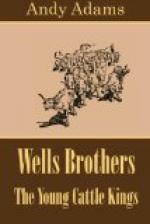AN INDIAN SCARE
The year closed with dry, open weather. The cattle scattered wide, ranging farther afield, unmolested except by shifting winds. The latter was a matter of hourly observation, affording its lesson to the brothers, and readily explained by the older and more practical men. For instance, a north or the dreaded east wind brought the herd into the valley, where it remained until the weather moderated, and then drifted out of its own free will. When a balmy south wind blew, the cattle grazed against it, and when it came from a western quarter, they turned their backs and the gregarious instinct to flock was noticeable. Under settled weather, even before dawn, by noting the quarter of the wind, it was an easy matter to foretell the movement of the herd for the coming day.
The daily tasks rested lightly. The line was ridden as usual, but more as a social event than as a matter of necessity. The occasional reports of Manly to his employer were flattering in the extreme. Any risk involved in the existing contract hinged on the present winter, and since it was all that could be desired, every fine day added to the advantage of Wells Brothers. So far their venture had been greeted with fair winds, and with not a cloud in the visible sky. Manly was even recalled by Mr. Stoddard early in February.
Month after month passed without incident. Spring came fully a fortnight earlier than the year before. By the middle of March, the willows were bent with pollen, the birds returned, and the greening slopes rolled away and were lost behind low horizons. The line-camp was abandoned, the cattle were scattered over the entire valley, and the instincts to garden were given free rein. The building of two additional tanks, one below the old trail crossing and the other near the new camp above, occupied a month’s time to good advantage. It enlarged the range beyond present needs; but the brothers were wrestling with a rare opportunity, and theirs was strictly a policy of expansion.
An occasional trip to the railroad, for supplies or pressing errand, was usually rewarded with important news. During the winter just passed, Kansas had quarantined against Texas cattle, and the trail was barred from that state. Early in May information reached the ranch that the market interests of Dodge City had moved over the line into Colorado, and had established a town on the railroad, to be known as Trail City. A feasible route lay open to the south, across No-Man’s-Land, into the Texas Panhandle, while scouting parties were out with the intent of locating a new trail to Ogalalla. It would cross the Republican River nearly due westward from headquarters, and in the neighborhood of one hundred miles distant.
“There you are,” said Sargent, studying a railroad folder. “You must have water for the herds, so the new market will have a river and a railroad. It simply means that the trail has shifted from the east to the west of your range. As long as the country is open, you can buy cattle at Trail City, hold them on the Colorado line until frost, and cross to your own range with a few days’ travel. It may prove an advantage after all.”




